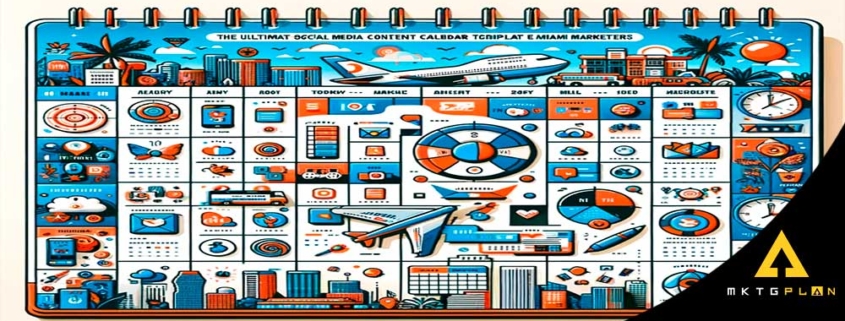The Ultimate Social Media Content Calendar
Mastering the Art of Social Media Content Scheduling with a Calendar
Introduction
Have you ever found yourself racing against time to generate social media content? Perhaps you have been in a situation where content creation had to be done hastily, very close to the publication deadline. More often than not, such rushed content fails to cater to the needs of the audience and neglects to tie in special topics or events you could have planned for ahead of time.
Imagine a scenario where you never had to stress about content production again. In this article, we’ll delve into the most effective social media content calendar template and provide a comprehensive guide on how to use it for the benefit of your business and audience engagement.
The Importance of a Social Media Calendar
Flori Needle was a social media manager tasked with overseeing the Instagram strategy. She faced frequent challenges while devising a content schedule and often had to create Instagram posts at the last minute due to a lack of prior planning.
After some time, Flori devised a strategy which she acknowledges would have been greatly simplified if she had a process in place before starting her postings, saving her time and energy spent on trial and error. This underscores the critical role of a social media content calendar; it aids in tracking deadlines, managing content creation tasks, and ensuring transparency with stakeholders dependent on your social media publishing schedule.
A functional content calendar isn’t just about scheduling a few Instagram posts on your Google calendar. It delves much deeper. Let’s explore the benefits of a well-structured social media calendar.
Benefits of a Social Media Calendar
1. Superior Organization
When you’re dealing with multiple social media channels, an organized content calendar is essential in keeping your team on track. Rather than brainstorming content ideas spontaneously, you can plan your content around your business needs. This will also allow you more time to create trending content around upcoming holidays and events. For instance, if your company has a significant event on the horizon, a content calendar will help you strategize the promotional content in good time.
A social media calendar also keeps your team updated about when content will be published. Keeping everyone informed about what’s going live and when, avoids potential miscommunication or confusion down the line.
2. Seamless Scalability
A social media calendar can also assist in scaling your content production without overburdening your marketing team. By planning ahead, you can balance content production with your team’s bandwidth and the other responsibilities your department bears.
As you scale, I recommend keeping track of post analytics to gauge how your content is performing. Monitoring your metrics will assist you and your team in discerning the content that most engages your audience.
3. Enhanced Content Quality
Ultimately, a social media calendar gives your team ample time to do their best work.
Planning your posts in advance also allows you to review your work for errors or mistakes and helps your team maintain a consistent brand image. You have more time to strategize and work on essential campaigns, thus improving the value of your output.
Creating an effective social media content calendar shouldn’t be a burden. In the following section, we’ll delve into the critical components of any social media content calendar that will help you streamline your social media strategy at a tactical level.
Essential Components of a Social Media Content Calendar
Key
A clear and easy-to-understand key aids your stakeholders in comprehending the information in your calendar.
As long as the key is concise, anyone in your organization should be able to view your social media content calendar and understand precisely what’s happening across all platforms.
URLs and UTM Parameters
URLs and UTM parameters are analogous but distinct from each other. URLs are the links you’d like to share from your website (or even another website if you’re curating content) on your social media platforms.
A UTM parameter is an expansion of your URL. It’s a tracking code attached to the end of a URL and helps social media marketers track the efficacy of their posts driving traffic to their websites. By tracking and analyzing UTM parameters, you’ll see which content meets your conversion goals and which content drives the most engagement on social media platforms.
Date and Time
Incorporating dates and times in your social media calendar is not only helpful for your planning but also for other teams and stakeholders who rely on your social content.
When team members can view your calendar and pinpoint exactly when a post will be scheduled, they can carry on with their workflow with minimal disruptions.
Message
Transparency and context are essential when it comes to social media content calendars. Providing a brief synopsis of the post message or sharing the caption can significantly aid others within and outside your team in understanding the intent of the post.
Campaign
It’s crucial to start tracking metrics even before your campaign is concluded. Start monitoring your social media campaigns in your content calendar. This could be in the form of a drop-down list of pre-determined campaign names or if your campaigns are less frequent, you can simply copy and paste these names alongside the relevant content.
Image
Your social media content calendar can quickly turn into just another spreadsheet without some captivating imagery. Since a significant part of your social media content will likely be visual, add a thumbnail-sized version of the image you’ll be planning to include in the published post.
Creating Your Social Media Content Calendar
Before creating your social media content calendar, it’s critical to have a perspective on the bigger picture and have a solid planning. Below are detailed steps.
Step 1: Identify Your Goals
The initial step to building your social media content calendar is to identify your goals. These will aid you in determining how often you post, who will be involved in the content creation process, and which channels you’ll utilize.
Step 2: Align Your Team
Once you’ve identified your goals, it’s time to align your team towards these goals. Social media content creation is a challenging task, particularly for small marketing teams, so don’t short yourself on resources.
Step 3: Consider Diversity, Equity, Inclusion, and Belonging
While developing your social media calendar, remember that consumers today care more than ever that the brands they support are committed to diversity and inclusion.
Step 4: Set Up UTM Tracking
One of the most crucial parts of a social media calendar is the tracking part, which is often overlooked. The easiest way to track how your social media content is performing is to use UTM parameters.
Step 5: Create an Analysis Tracker in Your Calendar
For stakeholders who want to stay updated on how well your social media content is performing, create a tab showing clicks, views, engagements, and other metrics that will help evaluate your content’s success.
As you can see, there’s a lot to consider when constructing a thorough and efficient social media calendar. If this seems challenging, don’t fret! MKTG Plan is here to guide you through every step of the process. Download our free, easy-to-use social media content calendar template to kickstart your journey.
The Importance of a Well-Organized Social Media Content Calendar
Efficiency in Content Tactics
Incorporating a well-structured social media content calendar informs your team’s effort in aligning their content strategies. Essentially, it integrates your social media strategy with your website’s overall content plan, impacting your choices concerning content creation, distribution, and engagement.
If you’re a website design enterprise, your content calendar should align with any SEO strategy you intend to use. Like any plan, a good calendar streamlines your content tactics for efficiency.
Avoiding Redundancy
Have you ever wondered if you’ve previously posted your company announcements, recent blogs, or captivating infographics on your social platforms? Scrolling through past updates across various platforms can indeed be time-consuming.
A well-organized social media content calendar enables you to see all your past posts at a glance. This will help you avoid repeating posts, keeping your feeds fresh and engaging.
Enables Better Team Collaboration
Keeping your team informed about the planning and execution of your social media strategy aids in better collaboration and productivity. By centralizing your content planning in one place, teammates can review, suggest changes, and eventually approve the planned posts.
Whether you run an eCommerce store that requires constant product updates or a marketing agency like MKTG Plan dealing with multiple client accounts, a social media content calendar promotes harmony in team management.
Higher Content Quality and Consistency
Undoubtedly, planning posts ahead of time enhances the quality of your content. You and your team can take time brainstorming ideas, conducting necessary research, and integrating with assets from your websites design.
Moreover, consistency matters. Your followers will appreciate an easily recognizable voice and content style across your posts. Consistency aids in building a stronger brand and boosts engagement, visibility, and ultimately, conversion rates.
On-going Monitoring and Adjustments
Creating a social media calendar not only helps plan and strategize your content, but also aids in monitoring and adjusting your efforts as needed. At MKTG Plan, we hold frequent team meetings to review our calendar’s effectiveness, evaluate metrics, and suggest necessary adjustments.
By embracing flexibility, teams can tweak plans as needed, informed by on-going metrics and new learnings. Constant adjustment allows you to stay at the forefront of social media trends and meet the changing needs of your audience.
Conclusion
From this comprehensive guide, it should be evident why a well-planned and organized social media calendar is an essential tool for any business or agency pursuing success in social media marketing.
Whether you handle multiple social media profiles or manage a single platform, a content calendar is a lifeline to maintaining an engaging and consistent online presence. With proper planning, this tool enables superior organization, seamless scalability, enhanced quality of content, better team collaboration, and increased conversion rates.
A successful social media marketing strategy depends not only on well-crafted content but also on sound planning and organization. Presenting your audience with regular, engaging content is a critical factor to growing a committed and engaged following.
Ultimately, the key to mastering the art of social media content scheduling is being aware of your brand audience, having a well-structured social media content calendar, and embracing on-going monitoring and flexibility in your social media strategy.
Learning and implementing these strategies will contribute significantly to the success of your brand in the digital world, amassing more leads, conversions, and collaborators. Let’s get planning!



